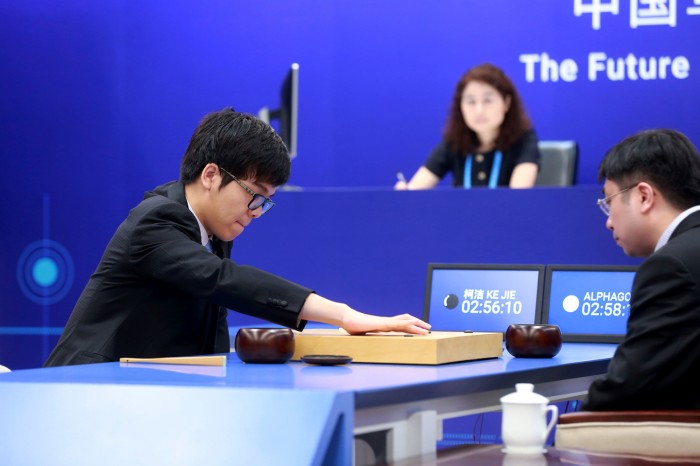A Stronger AlphaGo Defeats the World’s Number One Player

In the first of several games being held in China this week, a revamped AlphaGo defeated Ke Jie, a Chinese grandmaster who currently ranks as the game’s number one player.
Besides demonstrating the software’s mastery over the abstract and intuitive board game, the contest reveals how the machine-learning techniques that underpin AlphaGo are developing.
DeepMind’s Go Summit, held in the picturesque water town of Wuhzen, is also a significant event for its parent company, Alphabet. The company’s dealings in China have been fraught ever since Google left the country, in 2010, in protest over censorship. And beyond this, it shows how strong the appetite for cutting-edge artificial intelligence is becoming in that country.
Ke and AlphaGo will play three games at the event, which will also feature several games involving one or more players collaborating with AlphaGo. These games are significant because it will be important to devise ways for humans and AI programs to work together in the future.
DeepMind revealed AlphaGo in early 2016, demonstrating that an AI program could teach itself to play a game that requires instinctive play and has proven resistant to conventional programming approaches.
The program taught itself using reinforcement learning, a type of machine learning inspired by the way animals learn through positive feedback. The latest version relies more heavily on playing against itself, something that could prove useful for training machines to perform tasks where there isn’t abundant training data.
In March 2016, AlphaGo beat Lee Sedol, a South Korean grandmaster, in a widely followed series of games that showed the computer program really had achieved the very highest level of play.
Since then, AlphaGo has played many more games online under the pseudonym Master. In the opening game against AlphaGo, Ke Jie used one of the tactics played by the program in these games. However, the program went on to surprise him with some brilliant new tactics of its own.
“I was deeply impressed,” Ke Jie said through an interpreter after the game. Referring to a type of move that involves dividing an opponent’s stones, he added: “There was a cut that quite shocked me, because it was a move that would never happen in a human-to-human Go match.”
“Huge respect to Ke Jie for pushing AlphaGo to its limits,” said Demis Hassabis, cofounder and CEO of DeepMind. “I see AlphaGo as a tool for Go players and the Go community to explore the truth of Go, and to find out more.”
Ke Jie seemed to agree. “The influence of AlphaGo has been widespread. We should explore our minds and expand our thinking.”
Keep Reading
Most Popular
Large language models can do jaw-dropping things. But nobody knows exactly why.
And that's a problem. Figuring it out is one of the biggest scientific puzzles of our time and a crucial step towards controlling more powerful future models.
The problem with plug-in hybrids? Their drivers.
Plug-in hybrids are often sold as a transition to EVs, but new data from Europe shows we’re still underestimating the emissions they produce.
Google DeepMind’s new generative model makes Super Mario–like games from scratch
Genie learns how to control games by watching hours and hours of video. It could help train next-gen robots too.
How scientists traced a mysterious covid case back to six toilets
When wastewater surveillance turns into a hunt for a single infected individual, the ethics get tricky.
Stay connected
Get the latest updates from
MIT Technology Review
Discover special offers, top stories, upcoming events, and more.